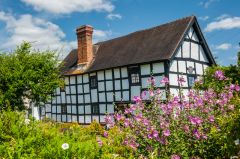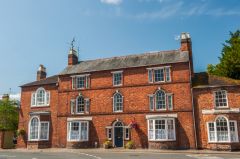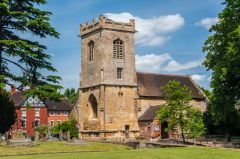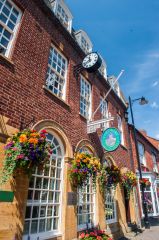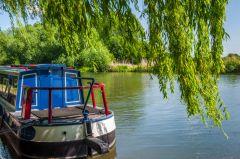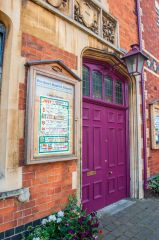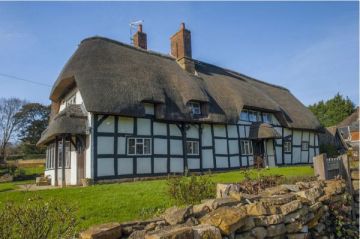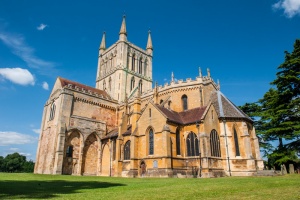
Pershore is the self-proclaimed "capital of the plum", a tribute to the tradition of plum orchards in the area. The town grew up around the abbey founded here in 689 by St Oswald, and it is the abbey church that is the feature of greatest interest for most visitors. The church has nothing of St. Oswald's Saxon establishment left, as the Benedictines built a powerful abbey on the spot in the early Norman period.
Pershore Abbey was one of the largest abbeys in Britain, larger even than Worcester Cathedral. The abbey itself was destroyed in the Reformation, but the local inhabitants saved the church from destruction by purchasing it for their own use.
The striking lantern tower dates from 1350, while in the interior the round font is beautifully carved, and the interior as a whole boasts superb vaulting joined by carved bosses featuring beasts, leaf and foliate head patterns.
The town of Pershore is best approached from the east, over an elaborate 6 arched bridge across the Avon. The bridge dates from the medieval period, though the central arch was restored after extensive damage during the Civil War.
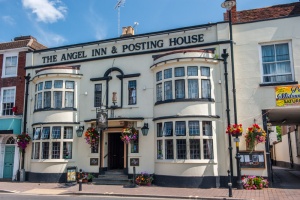
royalty and highwaymen
There are some fine buildings in the town, most from the Georgian period, though some medieval structures remain. One of the most interesting historic buildings is the timber-framed Almonry, at the west end of Abbey Park.
The Almonry served, as its name suggests, as the Almonry for the abbey. It was built in the early 16th century, then converted to a dwelling after the Dissolution of the Monasteries. It is now a private house.
Another interesting historic building is the Angel Inn & Posting House on the High Street. From the outside The Angel looks like a Georgian coaching inn, but underlying that elegant exterior is a 16th-century building.
Elizabeth I is thought to have stayed at The Angel. When the inn was undergoing restoration in 1922 a wall painting of Queen Elizabeth was discovered, most likely painted in 1570. A less celebrated visitor was a 17th-century highwayman named Captain Thomas Dangerfield, who preyed upon local travellers by day and slept peacefully at The Angel by night.
Just up Broad Street from the Angel is the Baptist Church, one of the oldest in England. The church was founded in 1658. One of the most interesting ministers was Rev John Ash, an 18th-century lexicographer who wrote 'The New and Complete Dictionary of the English Language.'
You can learn more about the history of Pershore at the Heritage Centre museum, located upstairs in the town hall building on High Street. The heritage centre is small, but a delightful jumble of historic artefacts are crammed into two rooms. There is a very good display on local lace-making, a WWI memorabilia exhibit, children's' toys, and a wealth of archival photos and documents.
About Pershore
Address: Pershore,
Worcestershire,
England
Attraction Type: Town
Location map
OS: SO945 462
Photo Credit: David Ross and Britain Express
HERITAGE
 We've 'tagged' this attraction information to help you find related historic attractions and learn more about major time periods mentioned.
We've 'tagged' this attraction information to help you find related historic attractions and learn more about major time periods mentioned.
Historic Time Periods:
Find other attractions tagged with:
Civil War (Architecture) - Georgian (Time Period) - Medieval (Time Period) - Norman (Architecture) - Reformation (Historical Reference) - Saxon (Time Period) - St Oswald (Person) -
NEARBY HISTORIC ATTRACTIONS
Heritage Rated from 1- 5 (low to exceptional) on historic interest
Pershore Abbey - 0.4 miles (Historic Church) ![]()
Little Comberton, St Peter's Church - 2.5 miles (Historic Church) ![]()
Croome Park - 3.6 miles (Garden) ![]()
Croome d'Abitot, St Mary's Church - 3.7 miles (Historic Church) ![]()
Elmley Castle, St Mary's Church - 3.9 miles (Historic Church) ![]()
Strensham, St John's Church - 4.1 miles (Historic Church) ![]()
Churchill, St Michael's Church - 4.8 miles (Historic Church) ![]()
Spetchley Gardens - 5.7 miles (Garden) ![]()
Nearest Holiday Cottages to Pershore:
Peopleton, Worcestershire
Sleeps: 4
Stay from: £598 - 1990
More self catering near Pershore
